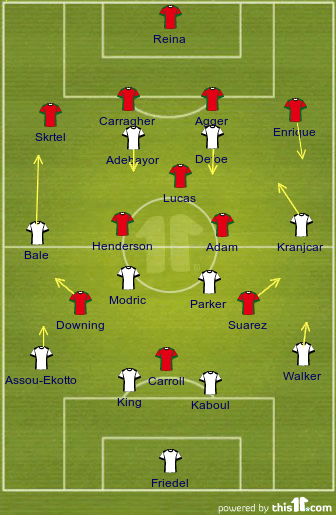Sunday, 18 September 2011
Tottenham 4-0 Liverpool
One of the most unpleasant games to watch as a Liverpool fan for quite some time.
First of all, it needs to be said that Tottenham were absolutely superb - the pace they hit us with at the start was irresistible, each player looked sharp and fulfilled their responsibilities dutifully. They were professional and disciplined when they needed to be, but never stopped entertaining their fans. Harry Redknapp's tactical performance was absolutely perfect - he made the most of our weaknesses, and used his midfielders and strikers well to drag us out of position. So congratulations to Spurs.
Also, I don't know if perhaps there were one or two slightly harsh yellows (although I'm not even sure that there were), but on the whole the referee did his job well and I would be hugely disappointed if the referee's performance came to be used as a shield against criticism of Liverpool. That's the Wenger way, and it means problems don't get solved, they just keep recurring.
So Liverpool retained Henderson in the starting line-up, but dropped Kuyt to make way for the return of Andy Carroll. Tottenham lined up more-or-less as expected, except that Aaron Lennon was not fit to start, so Nico Kranjcar came in on the right wing:
Liverpool's narrow 4-3-3 was problematic for a number of reasons. Firstly, and most obviously, it played into Tottenham's hands vis-a-vis an obviously important match-up: Bale vs Skrtel. Bale is an orthodox winger in the sense that he likes to start from a deeper midfield position and accelerate towards the full-back, so you either need the full-back to come very deep to mark him, or (more intelligently) to use a deeper winger (i.e. Kuyt or Henderson could've done this) to track back and stop him before he can reach full speed. As it was, Downing, with an attacking remit and a tendency to drift inside onto his stronger left foot, was nowhere to help out Skrtel. Skrtel was eventually sent off (although the team-shape had been sort-of rectified by moving Henderson to the right after 15 minutes). The point is, Liverpool's midfielders played extremely narrow, all getting dragged into closing down Modric but ultimately getting caught in no-man's-land, leaving Skrtel and Enrique seriously isolated. See this heatmap from ESPN Soccernet (Bellamy, number 39, a late-substitute, is the anomaly):
Another big issue was the passivity of the shape. I've talked about passivity before, and how it is increasingly important to be assertive and aggressive in the modern game. Hodgson's Liverpool were very passive, sitting and waiting for the other team to come to them, whereas Benitez's teams were assertive and aggressive, very rarely letting teams settle. On this occasion, with Lucas sitting in the deeper holding role, Henderson and Adam should've been responsible for stemming the play from Modric and Parker, but they dramatically failed to do so. Adam's timing of challenge is occasionally terrible, and his decision-making and discipline is a serious weakness of a player who can be very important when on his game, but often ends up being carried by the rest of the team. He was sent off. Meanwhile, Henderson was painfully anonymous. I have tended to defend Henderson against criticism, but he simply was not suited for today's game, and it was disappointing to see quite how much he let it pass him by. He just wasn't aggressive enough, and he really, really needs to improve in that sense if he is to be a long-term success at Liverpool. Ultimately, Liverpool's passive formation (with a holding anchor-man midfielder) didn't suit the fast-paced closing down they had clearly been told to do, so players got tired, frustrated, and made rash challenges.
So, from a tactical point of view, Dalglish's plan failed miserably. Lucas kept getting drawn out from his deeper role to close down Modric (who, smartly, stayed fairly deep to dictate the flow of the game) - but the distance he had to travel to get close to the excellent Croatian playmaker was too much for him to disrupt Tottenham's flow. Instead, a space opened up where Lucas had been, meaning that Adebayor and Defoe could comfortably receive the ball to feet (Modric ultimately completed 98 passes, while Adebayor made 65!). With three central midfielders against Tottenham's two (for the first 15 minutes), we should've been able to dominate possession, but our midfielders were simply in the wrong positions, trying to fulfil the wrong roles. Thank God Gerrard will return soon.
From an attacking point of view, we could mostly never get going because we couldn't get near the ball. But when we did, Carroll looked isolated, as Downing and Suarez were caught somewhere between trying to provide cover on the wings and trying to support the lone target-man. Carroll came in for a lot of criticism on Twitter, and perhaps from a tactical point of view he wasn't an ideal player to have on the wing when we needed to keep possession, but I didn't think he was that bad, and I assume Dalglish thought he would offer a goal-threat from set-pieces. He also didn't resort to throwing strops and making rash tackles like some of Liverpool's other players. The real villains today, in my opinion, were Charlie Adam, Martin Skrtel (although, in a foreign position, he should be afforded some leniency), and Dalglish and his coaching staff.
On Twitter, Liverpool fans have also been searching for positives. Some people have suggested Jose Enrique played OK, but I actually think we should've been brought down to Earth with the realisation that he isn't the perfect left-back we might've thought we'd signed from some of his performances. His positioning was often poor, and Tottenham were often as much of a threat down our left as down our right. It says a lot that Sebastian Coates (on after Daniel Agger's injury) was probably our best player, although he was positionally at fault for two of Tottenham's goals. Still, he did a decent job in difficult circumstances, and I would include the necessary lunging foul on Adebayor in that assessment. Carragher wasn't bad either, but he kept Adebayor onside for the fourth. Lucas did his best, but needed another combative midfielder to help him - it was interesting that we started to look slightly calmer once a fellow-enforcer (Jay Spearing) had come off the bench.
All in all, everyone made mistakes, and we would've lost this game against this Tottenham side pretty much regardless of red-cards and defensive errors, but many of us have been left particularly frustrated by some baffling tactical decisions by Liverpool's management team. Hopefully we can learn from these mistakes and bounce-back at Brighton on Wednesday.
Monday, 16 May 2011
Liverpool 0 - 2 Tottenham Hotspur
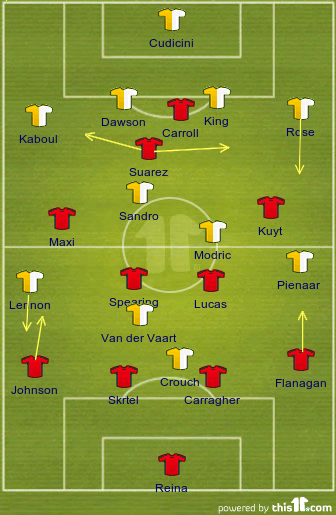
This was a fairly even if unremarkable game, neither side had many clear chances, but ultimately Tottenham made the most of their breaks, while Liverpool weren't able to raise their game to the level of recent weeks. The home side's build-up play was bitty, and there was very little of the flowing pass-and-move football which had livened up Liverpool's past few games. Some will lay the blame at the feet of Andy Carroll - wrongly, in my opinion, as he performed fairly well, and his build-up play was fine. There is, however, a question to be asked about whether Carroll fits into Liverpool's best (in the sense of being the most effective) eleven.
But that is a question for another time. The main problem for Liverpool on Sunday was their inability to deal with Tottenham's patient pressure and possession football - not that it posed a real threat to Pepe Reina, but it was disheartening to see that Tottenham were able to comfortably dominate for large periods, especially in the first-half. Part of the problem lay with the defensive shape which, although sturdy, didn't easily allow Liverpool to turn defence into attack. This diagram shows what happened when Tottenham held possession in Liverpool's half:
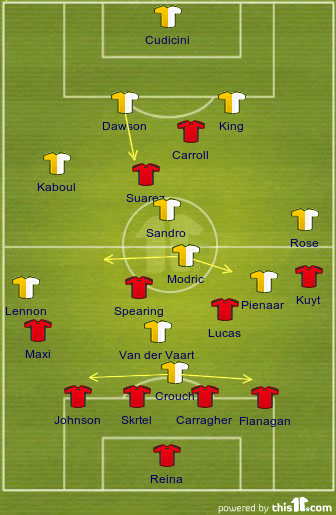
The back four would squeeze very narrow, and the two wide midfielders would track their opposing wingers very deep - Maxi in particular had clearly been instructed to double up on Aaron Lennon. In the main, this neutralised Tottenham's attacking threat (their goals came from a deflected shot from a corner and a dodgy penalty decision, after all), but once Spurs were a goal to the good, a more pro-active approach was needed. Modric's dynamic playmaking dominated the midfield where white shirts outnumbered reds 4-to-2 on occasion, with Pienaar drifting in from the flanks and Van der Vaart dropping deep to receive the ball.
The problem was that Liverpool didn't have the personnel available to them to diffuse the pressure and grab a hold of the game. I am not, generally, overly critical of the current squad, but we missed a ball-playing defender like Daniel Agger (who is injured), and, perhaps more crucially, a real quality midfield playmaker in the mould of Alonso or Aquilani who could hold onto possession in tight spaces and pass the ball out from defence when under pressure. We also didn't have the kind of wingers who could carry the ball up the pitch, so Spearing and Lucas tended to attempt risky direct passes more frequently than they perhaps should have. Sandro did a good job of anchoring the Spurs midfield which limited the opportunities for easy passes to Suarez in particular. And their backline stayed deep even when Tottenham had possession which meant that Liverpool couldn't diffuse pressure by hitting simple balls over the top or into the channels for Suarez or Carroll to chase. There was quite a large gap between the two front-men and the two defensive 'banks of four,' and it is possible that the inclusion of an extra attack-minded central midfielder (like Jonjo Shelvey, who was impressive again in his brief substitute appearance) in place of Andy Carroll might've given Liverpool a better chance of winning the game.
Friday, 13 May 2011
Liverpool vs Tottenham Hotspur - Tactical Preview

Tottenham’s post-Real Madrid meltdown has been so severe that certain Spurs fans have felt compelled to question Harry Redknapp’s future at the club. They have, after all, won just one of their last thirteen games – a run which has included home draws against Blackpool and West Brom, and, most recently, a defeat at Eastlands which ended their hopes of regaining a Champions League qualification spot. Redknapp has, in my opinion, done a decent job at Spurs on the whole, and doesn’t necessarily deserve too much criticism after two seasons which have been Tottenham’s most successful in recent history.
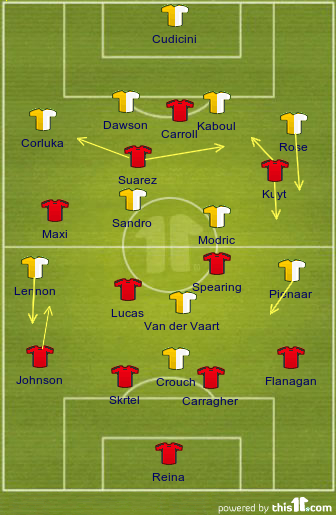
Wednesday, 6 April 2011
Champions League Quarter Finals First Leg - Talking Points
Tuesday, 5 April 2011
Tottenham Hotspur vs Real Madrid - Brief Tactical Preview
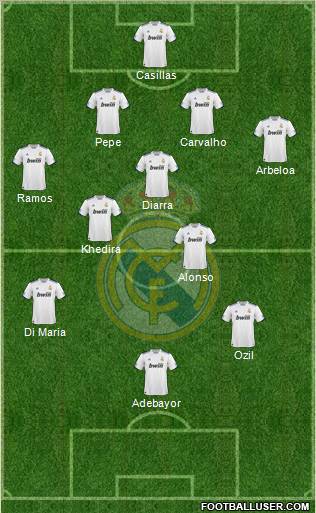
Admittedly, this formation is in some sense designed to achieve a scoreless draw, which might seem a bit too unambitious for a club like Real Madrid. Although not entirely devoid of attacking merit (RM's three deep midfielders will force Spurs to patiently concede them possession, or go and press higher up the pitch, leaving space in front of the defence for Ozil or Khedira to break into), it is indeed reactive, in the sense that it is designed to counter Tottenham’s strengths. But it should actually allow Madrid to be less passive in the game overall, by stemming Spurs’ attacks at the root (i.e. Modric, Bale), rather than risking a regular flow of balls to Crouch which would surely cause Pepe (6”1) and Carvalho (5”11) some serious problems.

